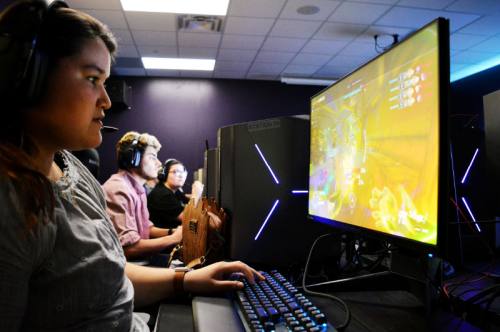The arena can fit about a dozen students at a time, but Marc Valdoria, coach and coordinator of the university’s new esports team, said the school is likely to expand the facilities soon to fit even more professional gaming setups.
Concordia’s esports team is in its infancy stage, just a few months into its first season on campus. College officials opened the doors to its esports arena, complete with 13 professional-level gaming stations and audio-visual production equipment, in late July.
Esports, or competitive video gaming, is relatively new to the college athletics universe. The National Association of Collegiate eSports, a nonprofit organization that coordinates competition between collegiate esports programs, launched in 2016 with just seven members. The NACE now boasts more than 150 members for the 2019-20 school year, according to its website.
Concordia established its esports team as a measure to increase its varsity athletics offerings without investing heavily in additional field space, said Ronda Seagraves, associate vice president for athletics for Concordia. But the team was also tasked with recruiting unconventional students to the college.
“The goal was to hit 10 [new] students that would not have come to Concordia otherwise, and we got 12 or 13,” Valdoria said. “The goal for next year is similar, so we’re going to continually grow this program.”
Valdoria recruited esports athletes through chat rooms specifically designed for high school and collegiate players on Discord, a voice and text chat software popular with gamers. The school also held tryouts over the summer for enrolled students interested in “walking on” with the team.
Sophomore Demetrius Harvey returned to the Austin area to join Concordia’s Overwatch team—a popular competitive video game—after spending his freshman year playing esports at Northern Virginia Community College.
“When I found out there was going to be a team in Austin, I reached out to them because I wanted to come back and be with my family,” Harvey said.
Going pro?
The professional esports world is new in its own right, although esports analytics company Newzoo in a February report forecasted the industry will hit $1 billion in revenue worldwide in 2019.
Overwatch League, a professional esports league, now has teams in Dallas and Houston, and the city of Arlington in late 2018 opened the Esports Stadium Arlington—a
$10 million, 100,000-square-foot facility solely dedicated to hosting esports events and tournaments.
Currently, the city of Austin does not have a professional esports team to its name, much less a facility to host them.
“I think what’s missing is support from the city, infrastructure to support or hold some tournaments,” Valdoria said. “We have all of these gamers in Austin that we just haven’t tapped into, and I think they’re just looking for a venue to do that.”
Harvey contends Austin has the intellectual infrastructure to attract the next wave of esports teams. Several major and indie game developers, such as Blizzard, Electronic Arts and Juegos Rancheros, have offices in Austin.
“Austin is big enough and has grown well enough that it deserves an esports team,” Harvey said. “If esports does another expansion, I think they’ll send a team here.”
Leveling up
Concordia will soon have local collegiate esports competition. After announcing in June it is launching its own esports program, St. Edward’s University’s varsity esports team will begin competition this spring, university officials told Community Impact Newspaper. St. Edward’s expects to hold a grand opening for its esports arena in December.
The esports athletes at Concordia currently play on Overwatch, Super Smash Bros. and Rocket League teams, although Valdoria said the program is likely to expand in the coming years and will include more games.
Harvey said he has watched the growth of collegiate esports programs on social media and believes most colleges will have to begin offering programs to prospective students. In the near future, Harvey predicts, esports teams will be one of the main programs offered on campuses throughout the country.
“People look at you now and don’t know what it is, but I feel like in a couple of years from now … they’ll know what the esports team is,” Harvey said.







